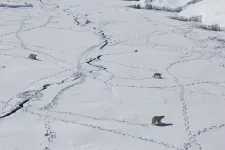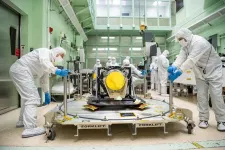(Press-News.org) TUCSON, Arizona — A study published in Clinical Cancer Research confirmed that tissue stiffening in the most common types of breast cancer, HER2-negative, can directly cause disease progression and metastasis, leading to detrimental outcomes for patients. The work was a collaboration between researchers at the University of Arizona Health Sciences and clinicians in Spain.
Researchers led by Miguel Quintela-Fandino, MD, at the Spanish National Cancer Research Center evaluated the MeCo Score™, a diagnostic test invented at the University of Arizona, and determined that it can potentially predict the likelihood of relapse or recurrence among patients with early-stage breast cancer.
When standard chemotherapy alone was prescribed in the neoadjuvant setting, high MeCo Scores were associated with much worse survival compared with low MeCo Scores; however, this difference in survival was minimized in patients who received antifibrotic therapy in addition to chemotherapy. Among high MeCo Score patients, antifibrotic therapy reduced the risk of recurrence by 62%, with an average follow-up period of 9.7 years after therapy.
The link between breast cancer progression to bone metastasis and fibrosis was first described in a 2021 study published in Cell Reports and authored by Ghassan Mouneimne, PhD, an associate professor of cellular and molecular medicine at the U of A College of Medicine – Tucson and of cancer biology in the Ginny L. Clements Breast Cancer Research Institute at the University of Arizona Cancer Center. That study determined the MeCo Score is a prognostic biomarker in breast cancer, while this new study establishes the MeCo Score as a predictive biomarker for antifibrotic benefit in HER2-negative breast cancer patients.
“In the case of this collaboration with our colleagues in Spain, we were able to determine that a drug with no previously known benefit to breast cancer patients, an antifibrotic called nintedanib, led to better outcomes when used in conjunction with traditional chemotherapy,” Mouneimne said. “The use of the MeCo Score was crucial to this effort.”
Mouneimne is hopeful that this work is a major step toward U.S. Food and Drug Administration approval of the MeCo Score.
“There’s certainly a lot more work ahead of us, as it will require more clinical validation to get FDA approval,” Mouneimne said, “but this really is a big step in the right direction.”
Mouneimne’s previous work identifying the link between fibrosis and advanced stages of breast cancer provided the mechanistic basis for developing the MeCo Score and led to the launch of MeCo Diagnostics LLC, a startup working to advance the technology so it can be used in the clinic. The inventing team, including Adam Watson, PhD — a former student in the U of A’s Cancer Biology program and the CEO of MeCo Diagnostics — worked with Tech Launch Arizona, the U of A office that commercializes inventions stemming from research, to protect the invention, develop a strategy for the new company and license the technology from the university.
“We’re hopeful that additional clinical confirmation of this discovery will firmly establish a new way to determine which patients may benefit from this fundamentally new therapeutic modality,” Mouneimne said. “As a generic-emergent drug, nintedanib is set for a substantial drop in price in the next couple of years, which may help mitigate the rising cost of treating breast cancer. It’s all about seeking new ways to personalize care and find more cost-effective treatments.
“We are in the initial stages of planning a prospective, multicenter trial using the MeCo Score to guide nintedanib treatment in patients with luminal, ER-positive breast cancer,” Mouneimne added.
Pavani Chalasani, MD, of the George Washington Cancer Center in Washington, D.C., will serve as the principal investigator for that trial. The goal is for the MeCo Score, which is determined using early biopsies, to enable patients to decide whether anti-fibrotic therapy would be beneficial in the neoadjuvant setting before surgery.
END
Clinical study confirms tissue stiffening in breast cancer can drive metastasis
Spanish researchers evaluated tissues for fibrosis using MeCo Score, a diagnostic tool invented at the University of Arizona
2024-10-22
ELSE PRESS RELEASES FROM THIS DATE:
Medicare has a revolving door, study suggests
2024-10-22
Right now across the country, tens of millions of older adults and people with serious disabilities have a choice to make: whether to stick with their current Medicare option, or change during Open Enrollment.
One of the biggest decisions they face is whether to go with a Medicare Advantage plan offered by an insurance company, or traditional Medicare coverage offered directly by the federal government.
If they change from one to the other, a new University of Michigan study finds, they may be entering a revolving door and find themselves changing again in the future.
On average, the study shows, 3% of people with traditional Medicare switch over to ...
Floor swabbing could help prevent COVID-19 outbreaks in hospitals
2024-10-22
COVID-19 is here to stay. As restrictions and human testing have waned, new research is tackling the challenge of how we can monitor, predict, and prevent cases and outbreaks of COVID-19, especially among vulnerable groups like hospitalized patients.
One approach is environmental surveillance. The most well-known incarnation is wastewater surveillance, which rose in prominence following the advent of the COVID-19 pandemic. But the Coronavirus in the Urban Built Environment research team, also known as CUBE, is exploring an alternative—swabbing the floors.
In a recent study at two hospitals in Ontario, CUBE researchers swabbed the floors ...
Paws of polar bears sustaining ice-related injuries in a warming Arctic
2024-10-22
Polar bears in some parts of the high Arctic are developing ice buildup and related injuries to their feet, apparently due to changing sea ice conditions in a warming Arctic. While surveying the health of two polar bear populations, researchers found lacerations, hair loss, ice buildup and skin ulcerations primarily affecting the feet of adult bears as well as other parts of the body. Two bears had ice blocks up to 1 foot (30 centimeters) in diameter stuck to their foot pads, which caused deep, bleeding cuts and made it difficult for them to walk.
The study led by the University of Washington was published Oct. 22 in the journal Ecology. It’s ...
Politics may influence gift-giving choices more than personal purchases
2024-10-22
DURHAM, N.H.—(October 22, 2024)—Political affiliation may not make a difference on everyday purchases for individuals, but it can play a role when buying for friends, family and co-workers, new research from the University of New Hampshire has found. This may have implications for gift buying this holiday season and beyond.
“We performed five different studies, each looking at buying different products, and asked people to make a choice for themselves and then a gift for someone they knew really well and found that politics played a bigger role when people were purchasing gifts, because that's a case where people are making a decision based ...
Listening skills bring human-like touch to robots
2024-10-22
Note to Editors: Video clips available at: https://duke.box.com/s/wtq3ofu3kf84ayw3qr6jajxdizt0rwxc
DURHAM, N.C. – Imagine sitting in a dark movie theater wondering just how much soda is left in your oversized cup. Rather than prying off the cap and looking, you pick up and shake the cup a bit to hear how much ice is inside rattling around, giving you a decent indication of if you’ll need to get a free refill.
Setting the drink back down, you wonder absent-mindedly if the armrest is made of real wood. After ...
Acclaimed WVU doctor and researcher elected to National Academy of Medicine
2024-10-22
A world-renowned West Virginia University physician and researcher has received one of the highest honors in the fields of health and medicine.
Dr. Sally Hodder, director of the West Virginia Clinical and Translational Science Institute, associate vice president for clinical and translational science at WVU and Chancellor’s Preeminent Scholar Chair, was elected to the National Academy of Medicine for her accomplishments as an infectious diseases physician and researcher.
Hodder, the first person from WVU to be chosen for the National Academy of Medicine, is one of only 100 new members from around the world announced at the Oct. 21 NAM ...
New study reveals larger insects' critical role in decomposition in arid ecosystems
2024-10-22
New study reveals that in arid ecosystems, larger arthropods such as termites and beetles play a crucial role in decomposition, challenging the traditional view that microbial activity dominates this process in dry environments. By demonstrating that macro-decomposition can peak during the summer in arid sites and that overall decomposition rates in these regions can be similar to or even exceed those in wetter climates, the research provides new insights into how decomposition functions in drylands and its implications for global carbon ...
NASA reveals prototype telescope for gravitational wave observatory
2024-10-22
NASA has revealed the first look at a full-scale prototype for six telescopes that will enable, in the next decade, the space-based detection of gravitational waves — ripples in space-time caused by merging black holes and other cosmic sources.
The LISA (Laser Interferometer Space Antenna) mission is led by ESA (European Space Agency) in partnership with NASA to detect gravitational waves by using lasers to measure precise distances — down to picometers, or trillionths of a meter — between a trio of spacecraft distributed in a vast configuration larger than the Sun. Each side of the triangular array ...
A new kind of authoritarianism: Democracy in decline at home and abroad
2024-10-22
A majority of Americans worry this year’s general election will be tainted by fraud, according to a recent NPR/PBS News/Marist poll released earlier this month—an ominous indication of the state of democracy in the U.S.
“When citizens lose trust in the electoral process, they may question the legitimacy of elected officials and the institutions they represent, which undermines the foundational principle that government authority is derived from the will of the people,” ...
Performance in physical tests can help manage treatment for metastatic lung cancer
2024-10-22
A study of patients with metastatic lung cancer by researchers based in Brazil and the United States has found that their performance in simple physical tests such as sitting down, standing and walking can help physicians arrive at a prognosis and approach to treatment.
An article on the study is published in the European Journal of Clinical Investigation.
The findings also included identification in the volunteers’ blood plasma of two substances – serine and M22G – with the potential to become biomarkers capable of indicating which patients are most likely to respond to chemotherapy.
The study was supported by FAPESP (projects 16/20187-6 and 19/17009-7), ...
LAST 30 PRESS RELEASES:
Urban trees can absorb more CO₂ than cars emit during summer
Fund for Science and Technology awards $15 million to Scripps Oceanography
New NIH grant advances Lupus protein research
New farm-scale biochar system could cut agricultural emissions by 75 percent while removing carbon from the atmosphere
From herbal waste to high performance clean water material: Turning traditional medicine residues into powerful biochar
New sulfur-iron biochar shows powerful ability to lock up arsenic and cadmium in contaminated soils
AI-driven chart review accurately identifies potential rare disease trial participants in new study
Paleontologist Stephen Chester and colleagues reveal new clues about early primate evolution
UF research finds a gentler way to treat aggressive gum disease
Strong alcohol policy could reduce cancer in Canada
Air pollution from wildfires linked to higher rate of stroke
Tiny flows, big insights: microfluidics system boosts super-resolution microscopy
Pennington Biomedical researcher publishes editorial in leading American Heart Association journal
New tool reveals the secrets of HIV-infected cells
HMH scientists calculate breathing-brain wave rhythms in deepest sleep
Electron microscopy shows ‘mouse bite’ defects in semiconductors
Ochsner Children's CEO joins Make-A-Wish Board
Research spotlight: Exploring the neural basis of visual imagination
Wildlife imaging shows that AI models aren’t as smart as we think
Prolonged drought linked to instability in key nitrogen-cycling microbes in Connecticut salt marsh
Self-cleaning fuel cells? Researchers reveal steam-powered fix for ‘sulfur poisoning’
Bacteria found in mouth and gut may help protect against severe peanut allergic reactions
Ultra-processed foods in preschool years associated with behavioural difficulties in childhood
A fanged frog long thought to be one species is revealing itself to be several
Weill Cornell Medicine selected for Prostate Cancer Foundation Challenge Award
Largest high-precision 3D facial database built in China, enabling more lifelike digital humans
SwRI upgrades facilities to expand subsurface safety valve testing to new application
Iron deficiency blocks the growth of young pancreatic cells
Selective forest thinning in the eastern Cascades supports both snowpack and wildfire resilience
A sea of light: HETDEX astronomers reveal hidden structures in the young universe
[Press-News.org] Clinical study confirms tissue stiffening in breast cancer can drive metastasisSpanish researchers evaluated tissues for fibrosis using MeCo Score, a diagnostic tool invented at the University of Arizona




